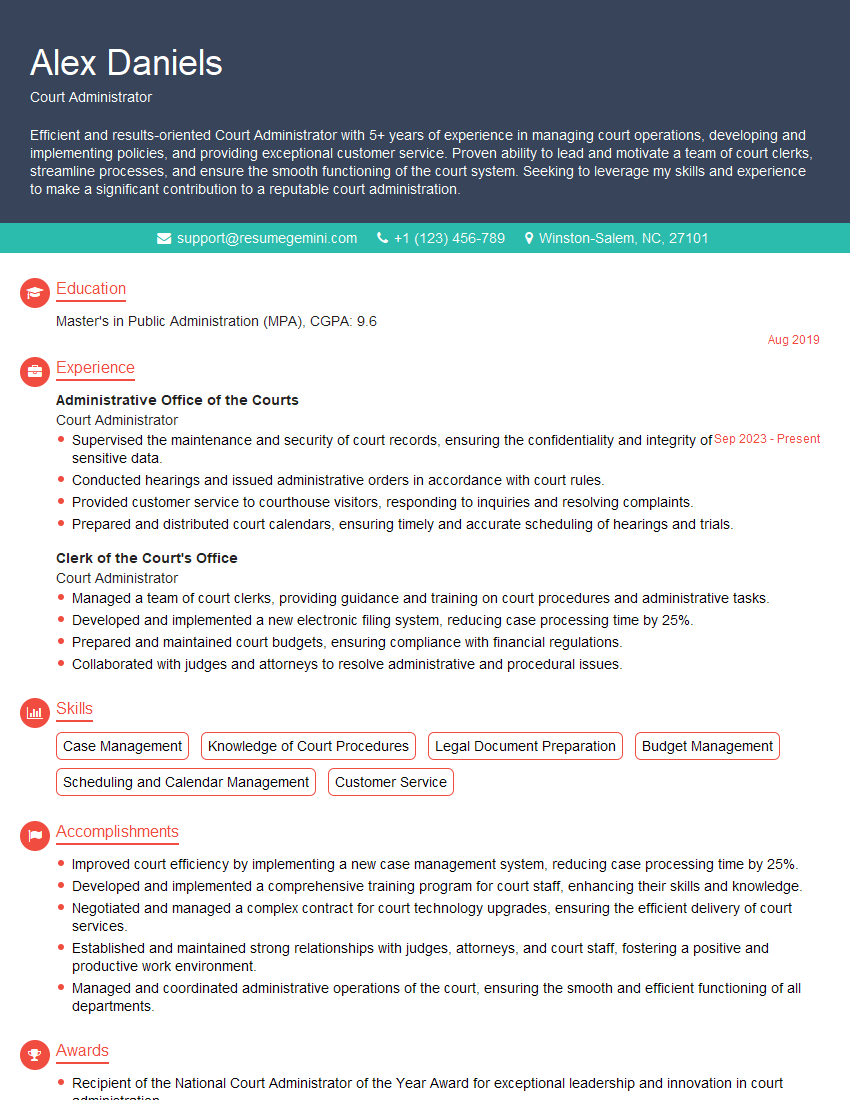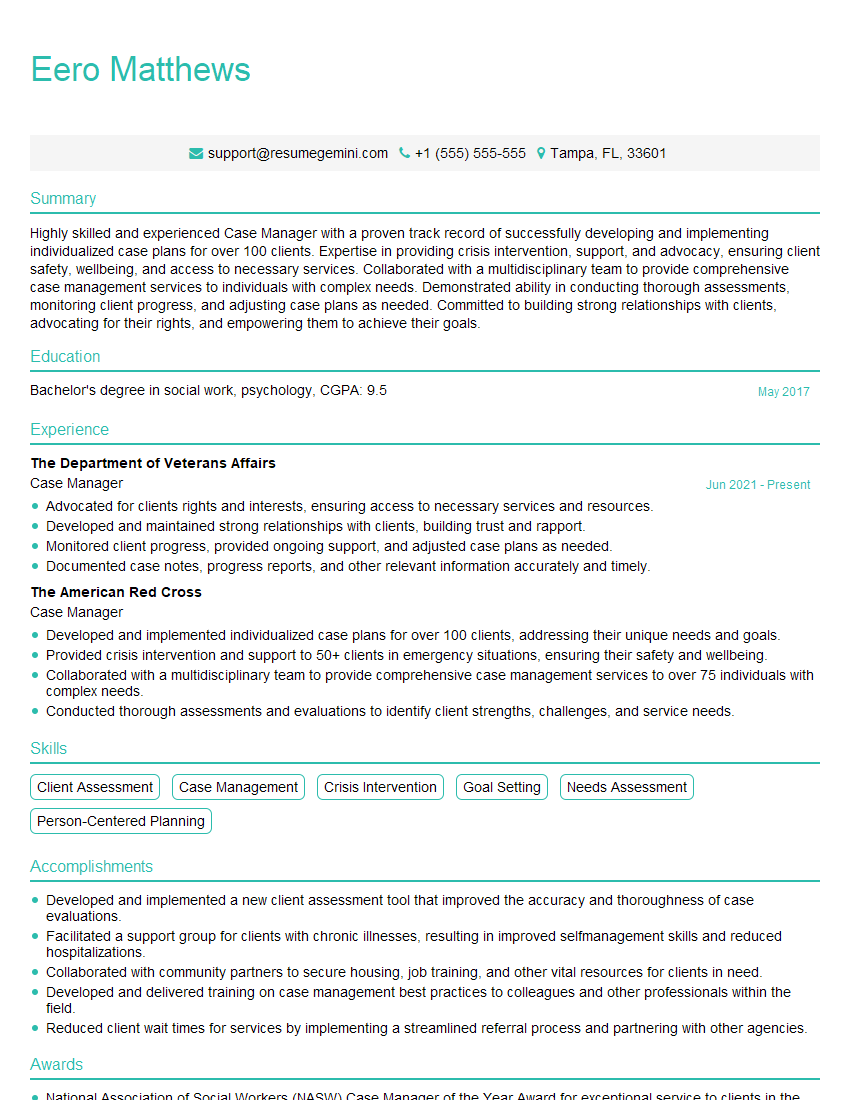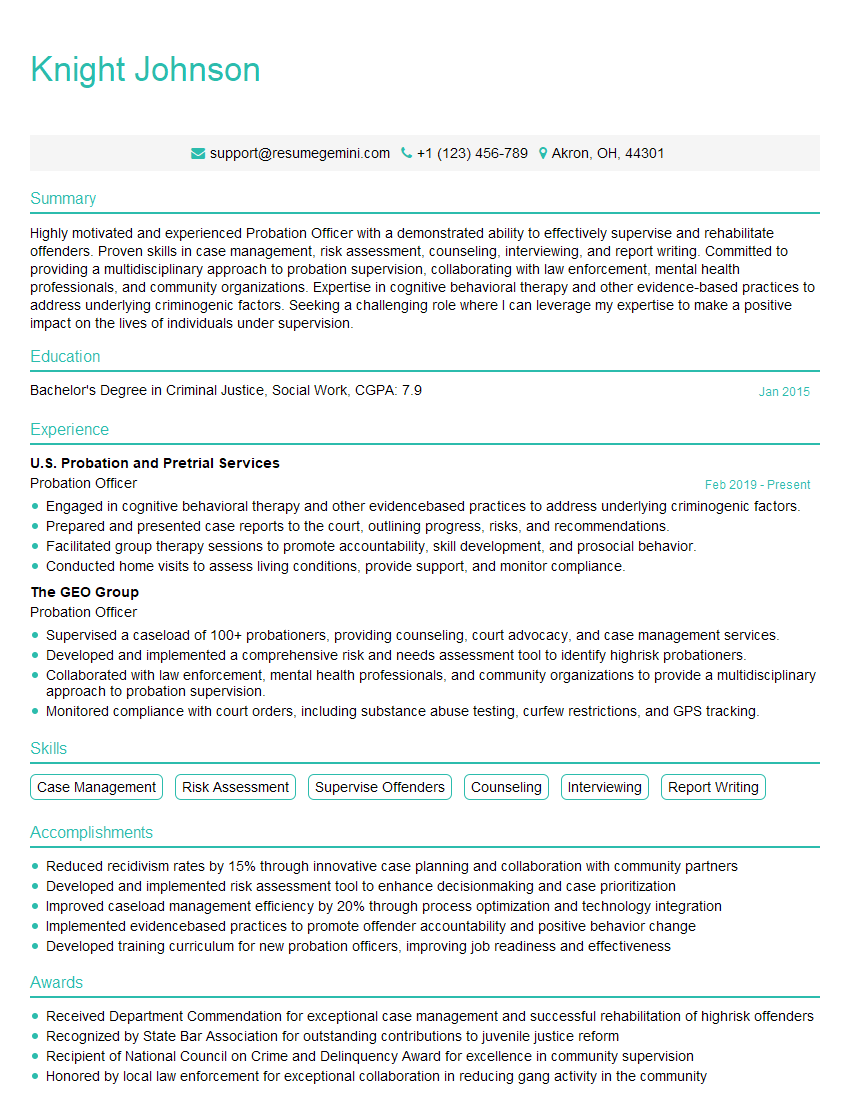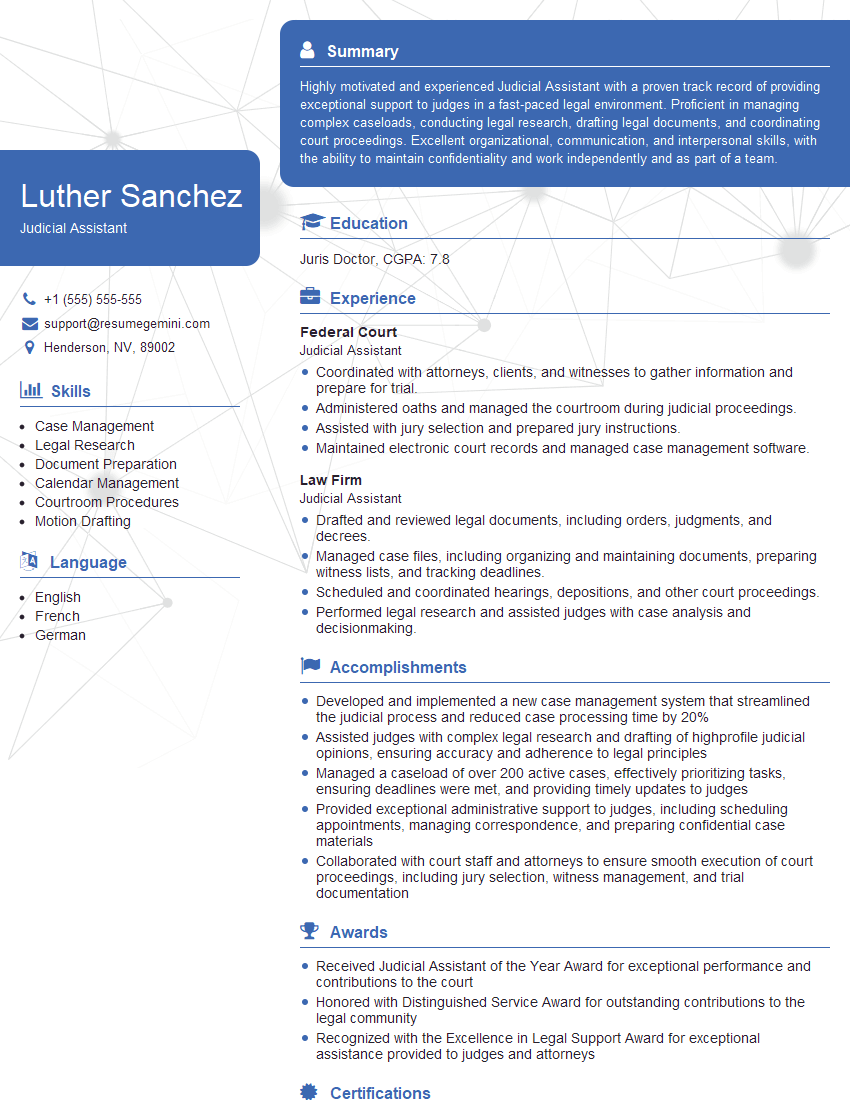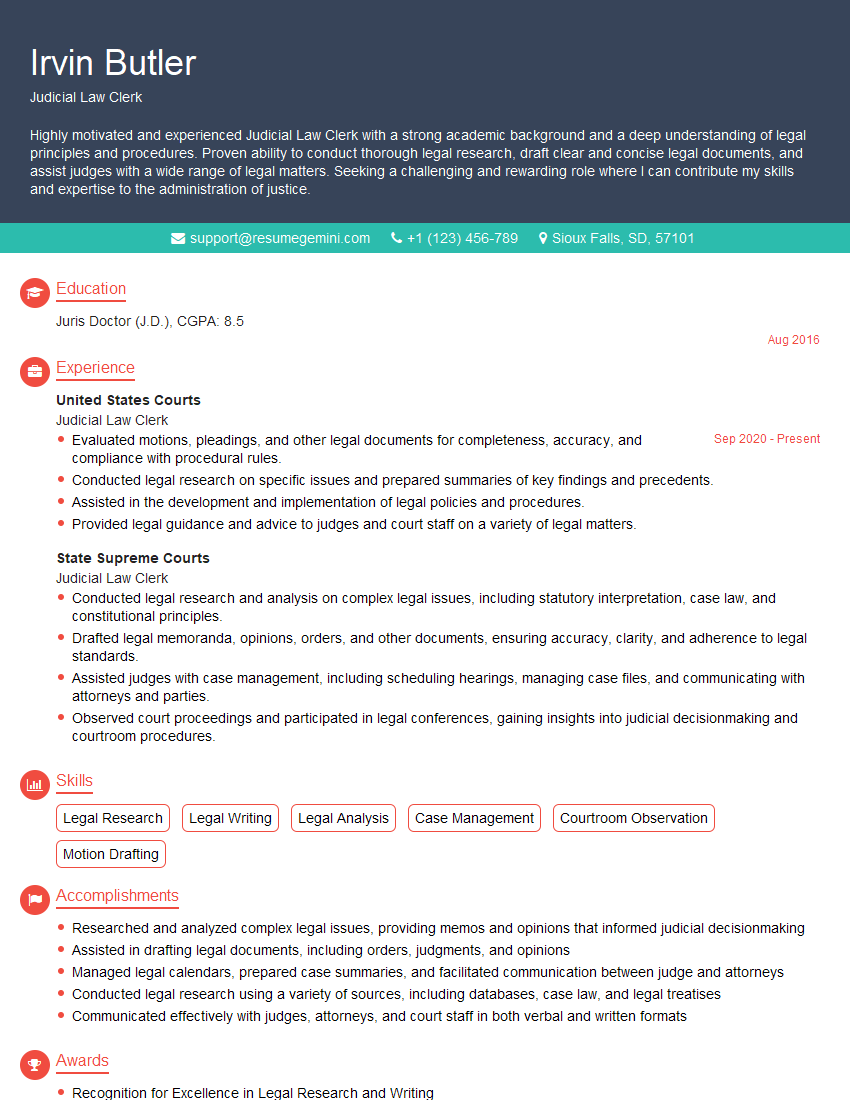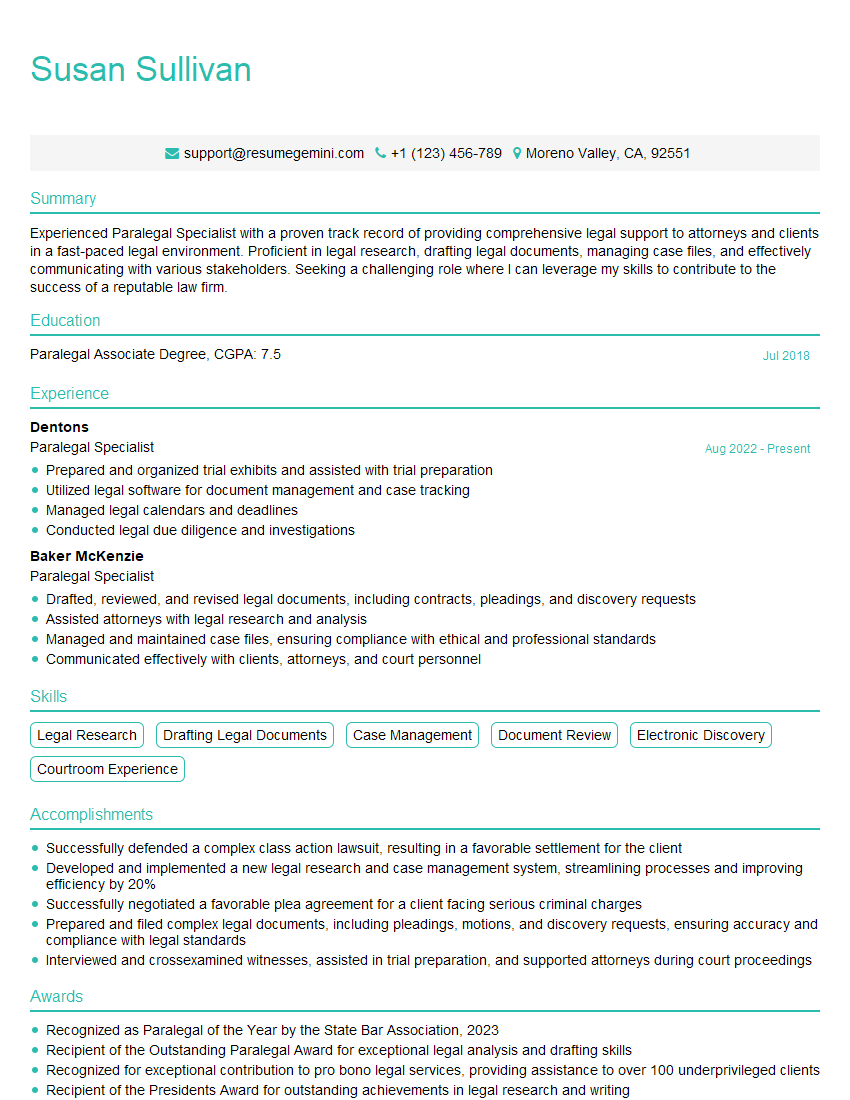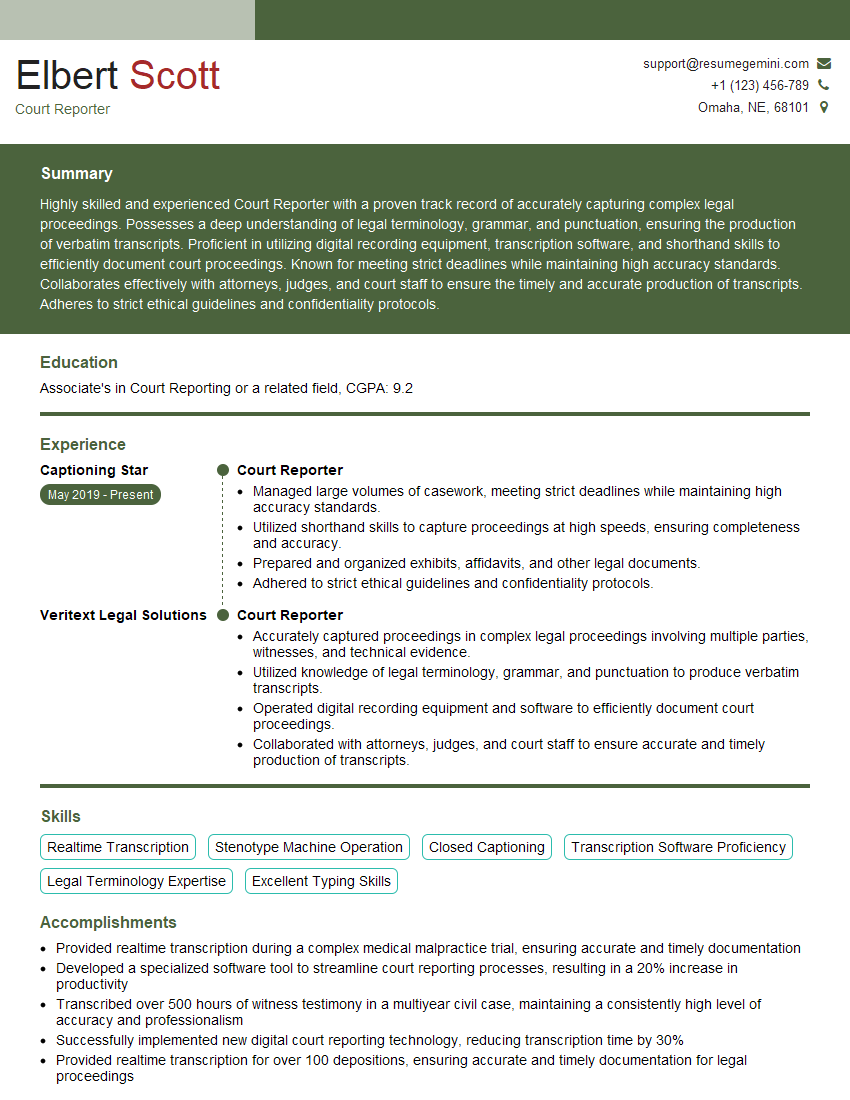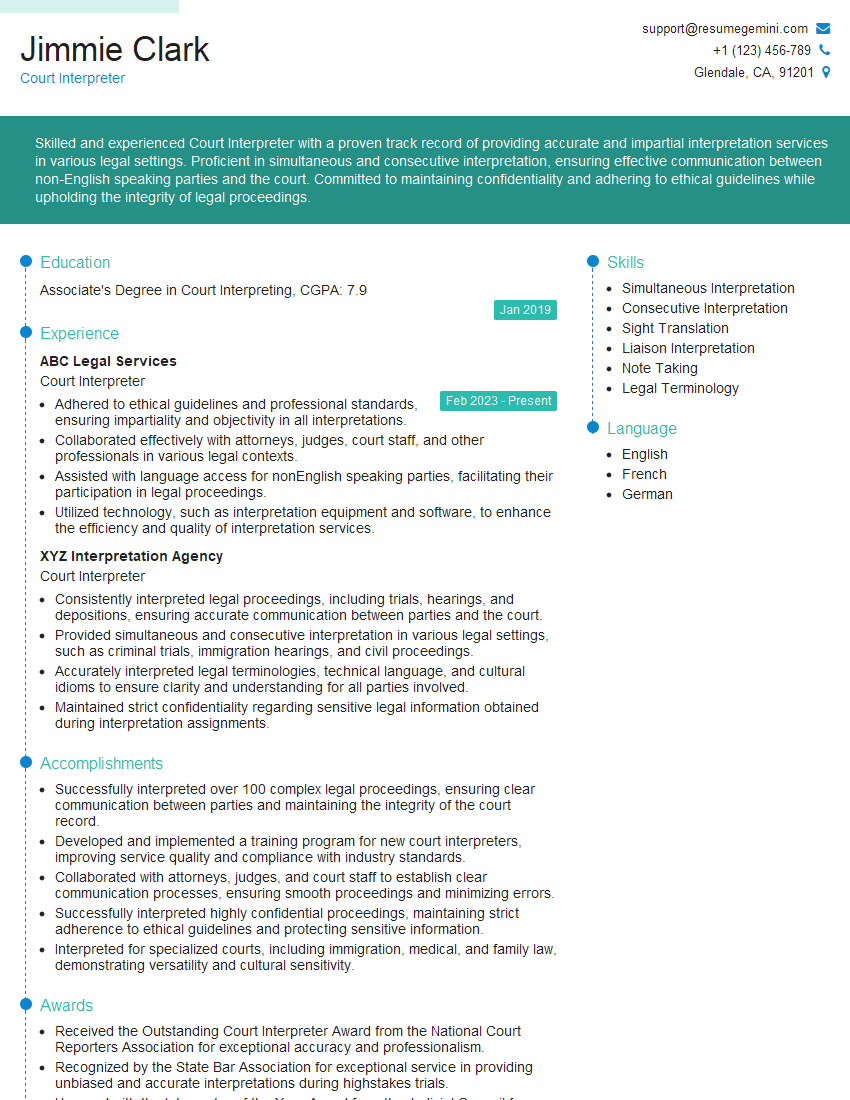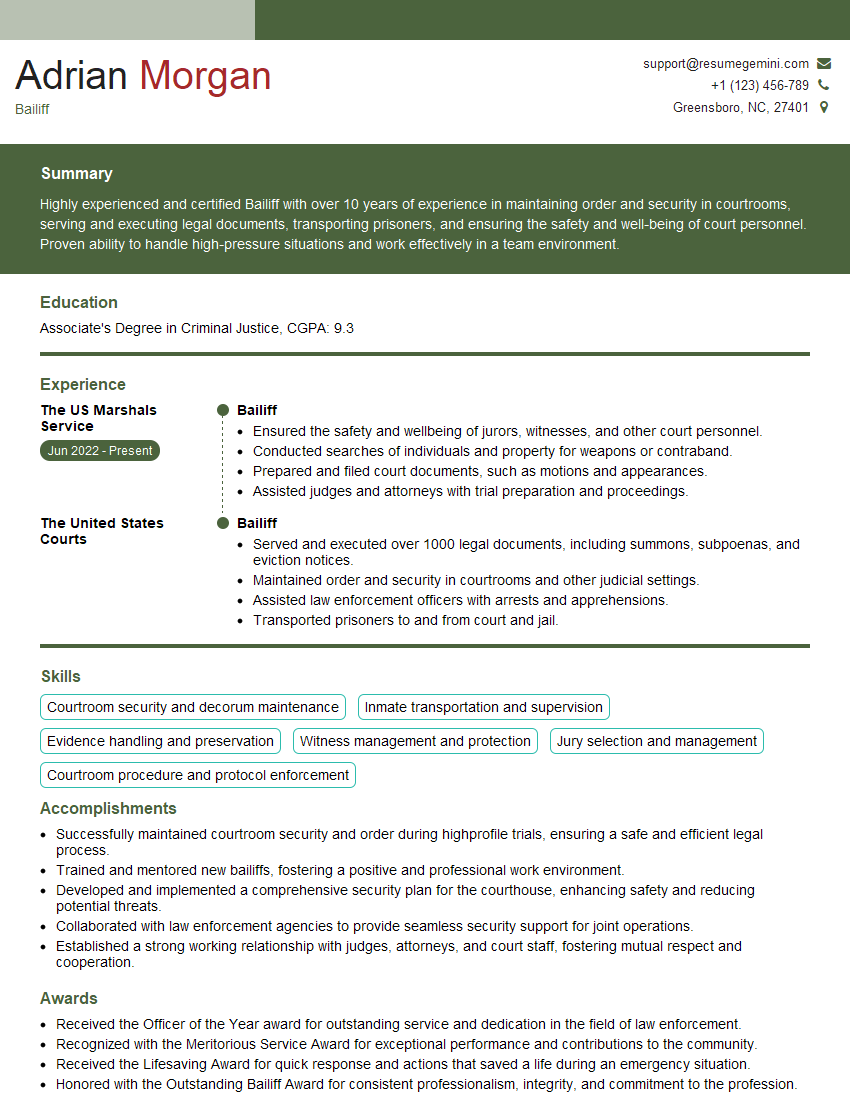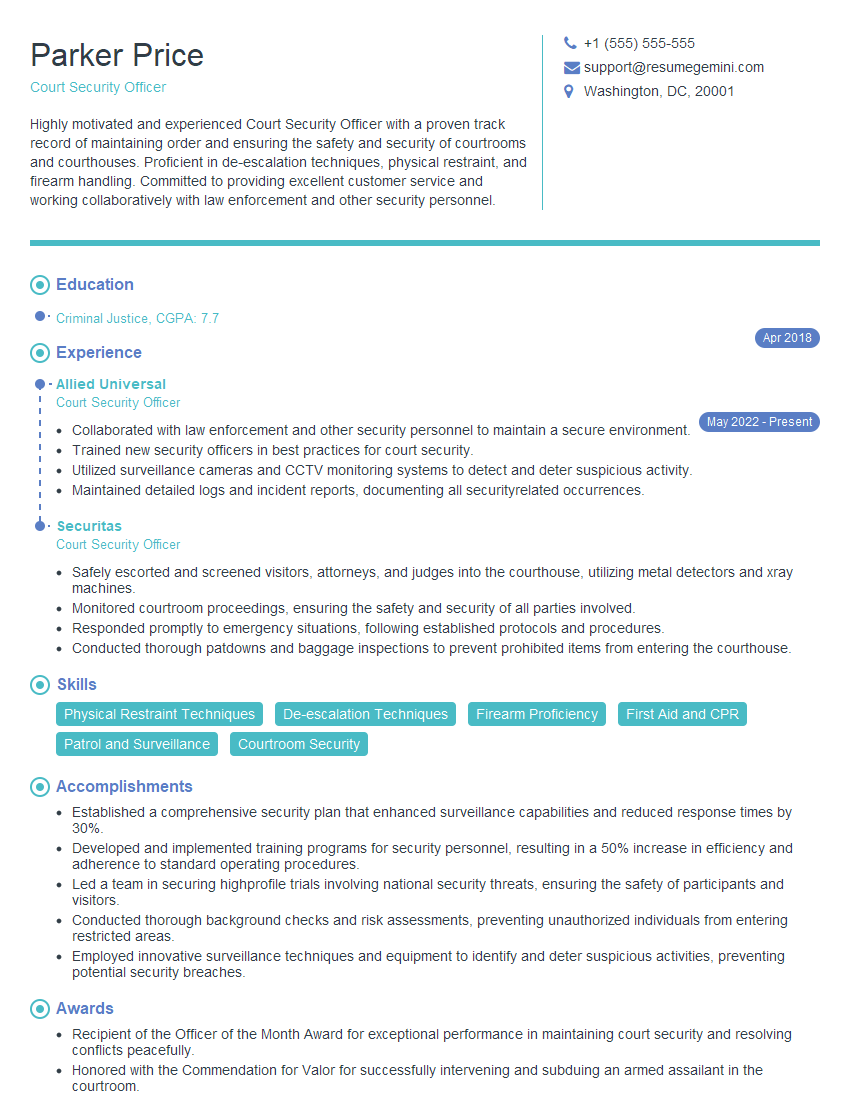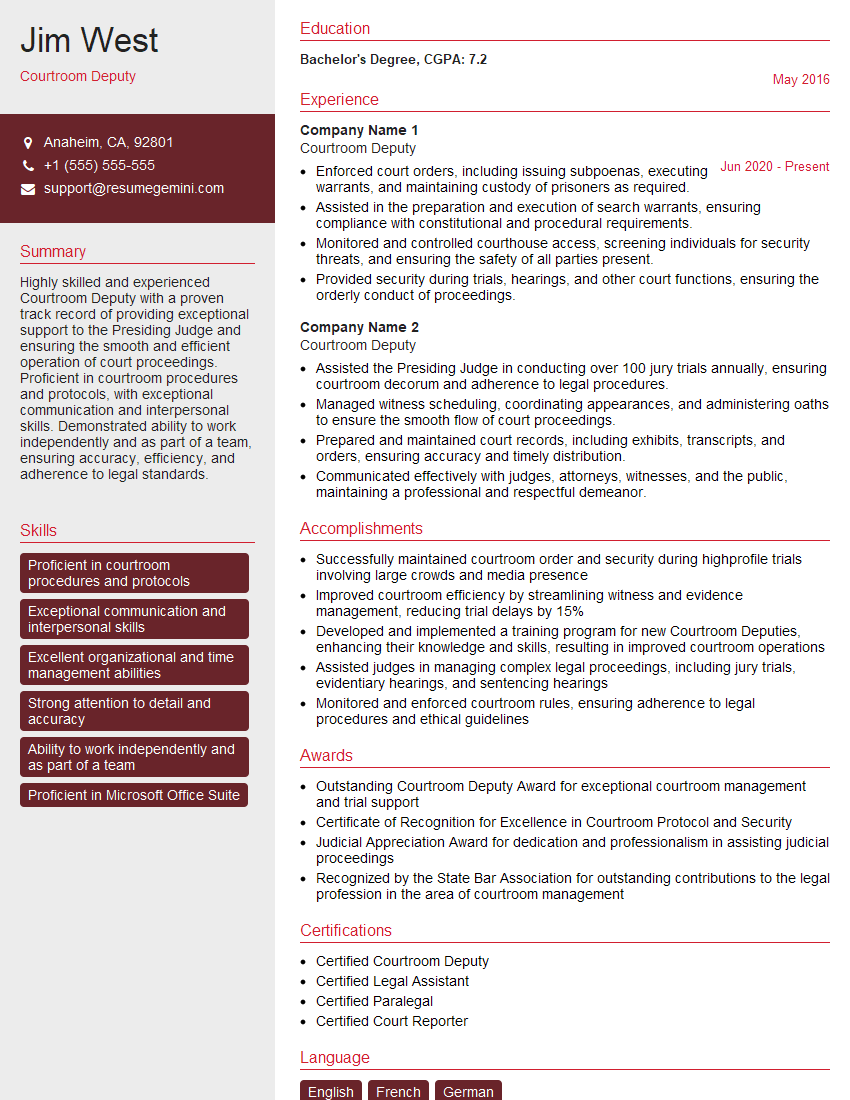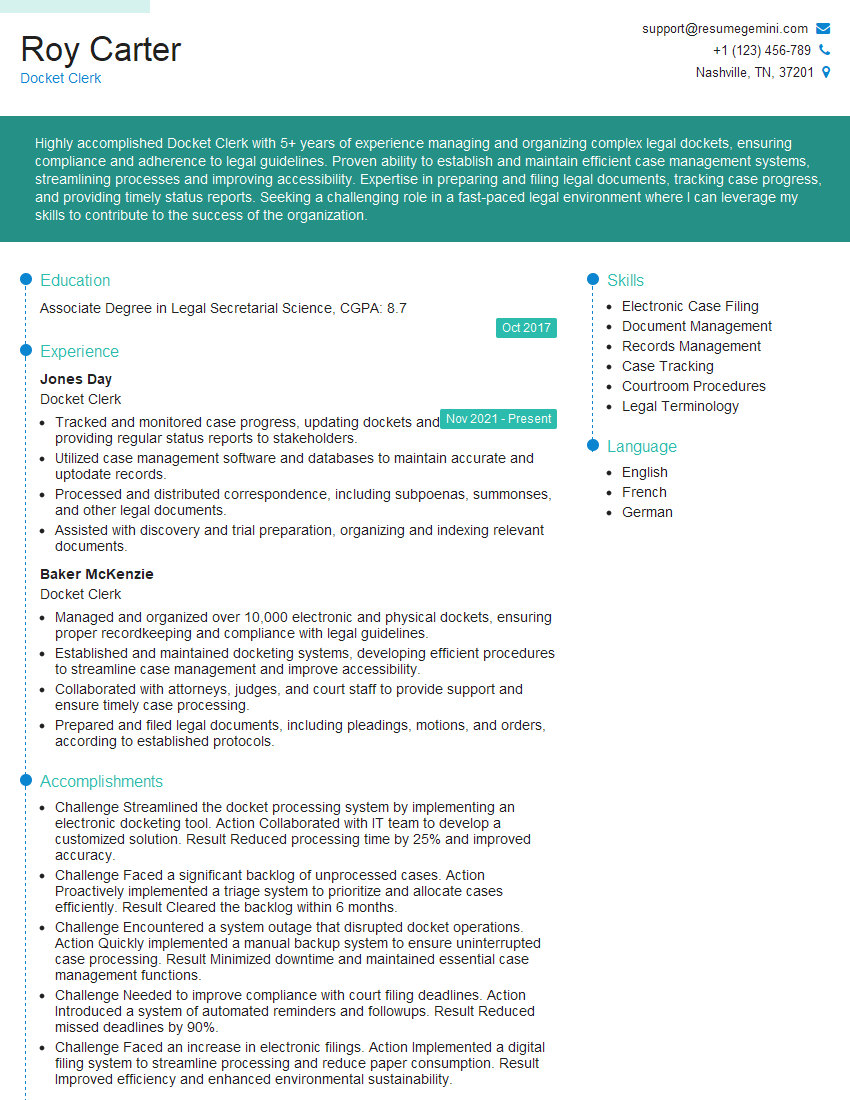Unlock your full potential by mastering the most common Cross-Training in Additional Court Functions interview questions. This blog offers a deep dive into the critical topics, ensuring you’re not only prepared to answer but to excel. With these insights, you’ll approach your interview with clarity and confidence.
Questions Asked in Cross-Training in Additional Court Functions Interview
Q 1. Describe your experience with cross-training in a court setting.
My experience with cross-training in a court setting spans over seven years, encompassing various roles within a large metropolitan court system. I’ve actively participated in programs designed to enhance staff flexibility and efficiency. This involved not just learning new tasks, but also understanding the interconnectedness of different court functions and how they contribute to the overall judicial process. It’s been a rewarding journey that has broadened my skills and deepened my understanding of the court’s operations.
Initially, my focus was on case management, but through cross-training, I’ve expanded my expertise to include areas like evidence processing, scheduling hearings, and interacting with the public at the counter. This holistic approach has allowed me to contribute more effectively to the court’s daily functions and support colleagues in different roles.
Q 2. What court functions are you proficient in?
I am proficient in a number of key court functions. These include:
- Case Management: This includes filing and docketing cases, managing deadlines, scheduling hearings, and ensuring case files are complete and accurate. I’m experienced in handling both civil and criminal cases.
- Evidence Processing: I am skilled in the proper handling, logging, and storage of physical and digital evidence, adhering to strict chain-of-custody protocols.
- Public Counter Interaction: I am comfortable and efficient in assisting members of the public with their inquiries, providing information, and directing them to the appropriate resources.
- Hearing Scheduling and Coordination: I can efficiently schedule hearings, manage conflicts, and ensure all parties are properly notified. I also assist with courtroom preparation.
- Record Management: I have extensive experience utilizing court record management systems, ensuring accurate data entry, retrieval and archival.
Q 3. How do you adapt to new court procedures or software?
Adapting to new court procedures or software is a crucial aspect of my role. I approach this systematically, starting with a thorough review of any provided documentation or training materials. I then engage in hands-on practice, often using practice datasets or mock scenarios to become comfortable with the new system or procedure.
I find it helpful to break down complex processes into smaller, manageable steps. I also actively seek feedback from colleagues and supervisors to identify areas for improvement and ensure I’m following best practices. For example, when our court implemented a new case management system, I participated in the initial training sessions, then spent additional time experimenting with the system before using it in real-world scenarios. I also created a cheat sheet summarizing key functions and frequently used shortcuts.
Q 4. Explain a time you had to learn a new court function quickly.
One instance that stands out involved a sudden increase in case filings due to a major weather event. The court needed to quickly implement a new emergency case prioritization system. I was tasked with learning and implementing this new system within 24 hours. To accomplish this, I immediately engaged with the IT department and senior management to understand the system’s parameters. I then created a detailed step-by-step guide for myself and trained my colleagues, ensuring everyone understood the new procedures before implementing them.
This experience highlighted the importance of quick learning and clear communication in a high-pressure environment. My proactive approach ensured that the court could efficiently handle the influx of cases.
Q 5. How do you prioritize tasks when handling multiple court functions?
Prioritizing tasks when handling multiple court functions requires a strategic approach. I utilize a system that combines urgency, importance, and deadlines. I begin by identifying tasks with the closest deadlines and the most significant impact on the court’s operations. Then, I group similar tasks together to streamline my workflow. For instance, I might dedicate a specific time block to handling all incoming filings, followed by a block for scheduling hearings.
I also make use of task management tools, such as to-do lists and calendars, to visually track my progress and ensure nothing slips through the cracks. This proactive approach ensures efficient task completion and minimizes delays.
Q 6. Describe your experience with court record management systems.
I have extensive experience working with various court record management systems (CRMS), including CaseMaster and CourtView. My proficiency extends beyond basic data entry and retrieval. I understand the importance of data integrity and compliance with data privacy regulations. I am adept at using advanced search functions to quickly locate specific documents or information within the system. I also regularly participate in training sessions to stay updated on system upgrades and new features.
My experience includes working with both paper-based and electronic record systems, and I am comfortable transitioning between the two. I have an excellent understanding of how the CRMS integrates with other court software.
Q 7. How do you maintain accuracy and efficiency while cross-trained?
Maintaining accuracy and efficiency while cross-trained demands meticulous attention to detail and a structured approach. I employ several strategies to ensure high performance across all my responsibilities. These include:
- Double-checking my work: I always review my work before submitting it, ensuring accuracy and completeness.
- Utilizing checklists and templates: This helps standardize procedures and minimizes errors.
- Regularly updating my knowledge: I actively participate in training and professional development opportunities to stay up-to-date on best practices and new technologies.
- Seeking feedback: I regularly seek feedback from supervisors and colleagues to identify areas for improvement.
- Time management: Effective time management techniques, such as time blocking and prioritization, are crucial for handling multiple responsibilities.
By consistently applying these strategies, I consistently deliver accurate and efficient work across all court functions.
Q 8. How do you handle conflicting deadlines across multiple court functions?
Managing conflicting deadlines across multiple court functions requires a proactive and organized approach. Think of it like juggling – you need to keep all the balls in the air without dropping any. My strategy centers around prioritization and effective time management.
- Prioritization: I use a system like Eisenhower Matrix (urgent/important) to categorize tasks. This helps me focus on the most critical deadlines first, ensuring that time-sensitive matters receive immediate attention.
- Time Blocking: I allocate specific time slots in my day for each function. This prevents tasks from bleeding into one another and helps maintain focus.
- Communication: Open and transparent communication with judges, colleagues, and other stakeholders is crucial. If a deadline conflict arises, I proactively communicate the situation, propose solutions, and work collaboratively to find the best course of action. For example, if I have a critical filing deadline for a criminal case clashing with a scheduling conflict for a civil case, I communicate with the involved parties and may propose a brief postponement for the less urgent matter or seek assistance from colleagues to manage the workload.
- Contingency Planning: I always have a backup plan in case unexpected delays occur. This might involve prioritizing tasks based on their impact or seeking assistance from other court personnel.
Q 9. What strategies do you use to improve your proficiency in new court functions?
Improving proficiency in new court functions requires a multifaceted approach combining formal and informal learning. Think of it as building a skillset, brick by brick.
- Formal Training: I actively seek out relevant training programs, workshops, and seminars. This provides structured learning and ensures I am up-to-date with the latest procedures and technologies.
- Mentorship: I actively seek guidance from experienced colleagues. Their insights and practical advice are invaluable in navigating the complexities of new functions.
- Shadowing: I observe experienced personnel in action, learning by watching their techniques and approaches. This hands-on experience provides valuable context and allows me to adapt quickly.
- Self-Study: I utilize online resources, legal databases, and court manuals to supplement my learning and deepen my understanding. I might study case law related to the new court function to further understand its application.
- Practice: Consistent practice is vital for building confidence and refining skills. The more I work with a new function, the more proficient I become.
Q 10. Describe your experience with different court case types.
My experience encompasses a wide range of court case types, including criminal, civil, family, and probate matters. Each type presents unique challenges and requires a tailored approach.
- Criminal Cases: I’ve worked on cases ranging from misdemeanors to felonies, handling evidence management, witness coordination, and ensuring adherence to procedural rules. For instance, I assisted in managing evidence in a complex drug trafficking case, ensuring the chain of custody was meticulously maintained and all necessary documentation was prepared for trial.
- Civil Cases: My experience includes handling disputes involving contracts, personal injury, and property. I’ve assisted in case management, document filing, and scheduling hearings and trials. A key task was organizing and preparing case files for mediation involving a significant property dispute, ensuring all relevant documents were readily available to the involved parties.
- Family Cases: I’ve worked on cases related to divorce, child custody, and support, requiring sensitivity and attention to detail. I ensured that sensitive information, including addresses and social security numbers, was handled with care in family law cases involving child custody.
- Probate Cases: My experience includes assisting with the administration of estates, ensuring compliance with probate laws and regulations. This involved working carefully with sensitive financial documents ensuring all legal requirements were followed.
Q 11. How do you ensure confidentiality when handling sensitive court information?
Confidentiality is paramount in the court system. It’s not just a matter of following rules; it’s about upholding the integrity of the justice system and protecting individuals’ rights. My approach to ensuring confidentiality is multi-layered.
- Strict Adherence to Rules: I meticulously follow all court rules and regulations regarding the handling of sensitive information, including access restrictions, data encryption, and secure disposal of documents.
- Secure Data Handling: I utilize secure electronic systems, password-protected files, and encryption software to protect sensitive data.
- Limited Access: I restrict access to sensitive information to authorized personnel only. Any shared information is done through secured channels.
- Physical Security: I ensure physical security of court documents and records, using locked cabinets and restricted access areas.
- Ethical Conduct: I maintain strict ethical standards in all my dealings, refraining from discussing confidential information with unauthorized individuals.
Q 12. How do you collaborate with colleagues across different court functions?
Collaboration is essential in a court setting. Effective teamwork ensures smooth operations and efficient case management. My approach to collaborating with colleagues across different court functions involves open communication, mutual respect, and a shared commitment to justice.
- Regular Meetings: I participate actively in team meetings, sharing information, discussing challenges, and coordinating efforts.
- Open Communication: I maintain open lines of communication with colleagues through email, phone, and in-person discussions. I always keep my colleagues informed of developments in my area of responsibility that may affect their work, and vice-versa.
- Shared Workspaces: I utilize collaborative platforms and shared files to facilitate information exchange and seamless workflow. For example, I might create a shared document or spreadsheet to keep all parties updated on a particular case’s progress.
- Mutual Support: I actively support my colleagues, offering assistance and sharing expertise when needed.
Q 13. Explain your experience with court technology and software.
I am proficient in various court technologies and software, including Case Management Systems (CMS), electronic filing systems, and document management software. Think of these tools as being integral to the modern court’s functioning, similar to how a surgeon relies on advanced medical instruments.
- Case Management Systems (CMS): I am experienced in using CMS to manage case files, track deadlines, schedule hearings, and generate reports. For instance, I’m adept at using our court’s specific CMS to track the progress of cases through various stages, ensuring deadlines are met and all necessary documentation is available.
- Electronic Filing Systems: I am proficient in using electronic filing systems for submitting and managing court documents, ensuring efficient and secure document handling. I understand the intricacies of secure electronic filing, ensuring all uploaded documents are properly formatted and securely stored in the system.
- Document Management Software: I utilize document management software to organize, store, and retrieve court documents efficiently. I am skilled in using tools to redact sensitive information and ensure documents are properly indexed for easy retrieval.
- Video Conferencing: I use video conferencing technology to facilitate remote hearings and meetings, ensuring accessibility and efficiency. This is particularly crucial for ensuring access to justice, especially for remote parties.
Q 14. How do you identify and resolve problems related to court functions?
Identifying and resolving problems related to court functions requires a systematic and analytical approach. It’s like troubleshooting a complex machine – you need to diagnose the issue accurately before you can fix it.
- Problem Identification: I carefully analyze the situation, gathering information from multiple sources to identify the root cause of the problem. For example, if there are repeated delays in a specific type of case, I would investigate the potential causes, examining court procedure, staffing levels, and available technology.
- Data Analysis: I use data analysis techniques to identify trends and patterns that may contribute to recurring problems.
- Collaboration: I work collaboratively with colleagues and stakeholders to develop solutions, considering all viewpoints and perspectives.
- Implementation and Monitoring: I implement the chosen solution, closely monitoring its effectiveness to ensure it addresses the problem successfully. If the solution is not effective, I return to the analysis process and revise the approach.
- Process Improvement: I seek opportunities to improve court processes and procedures based on the problems encountered and the solutions implemented. This often involves developing better workflow procedures or recommending software updates.
Q 15. What are your strengths and weaknesses in performing court functions?
My strengths lie in my adaptability and efficiency in handling diverse court functions. I’ve successfully cross-trained in several areas, including case management, record-keeping, and jury management, demonstrating my proficiency in juggling multiple tasks and responsibilities. I’m adept at prioritizing tasks based on urgency and importance, ensuring smooth workflow. For example, during a particularly busy week with a high volume of filings, I prioritized time-sensitive matters such as setting hearings and managing emergency motions, maintaining overall organizational efficiency. My weakness, however, is sometimes getting overly involved in details, potentially delaying larger-scale projects. To mitigate this, I’m actively working on improving my time management skills through utilizing project management tools and techniques, focusing on delegation where possible.
Career Expert Tips:
- Ace those interviews! Prepare effectively by reviewing the Top 50 Most Common Interview Questions on ResumeGemini.
- Navigate your job search with confidence! Explore a wide range of Career Tips on ResumeGemini. Learn about common challenges and recommendations to overcome them.
- Craft the perfect resume! Master the Art of Resume Writing with ResumeGemini’s guide. Showcase your unique qualifications and achievements effectively.
- Don’t miss out on holiday savings! Build your dream resume with ResumeGemini’s ATS optimized templates.
Q 16. How do you stay updated on changes in court procedures and technology?
Staying updated on changes in court procedures and technology is crucial. I regularly attend continuing legal education (CLE) courses and workshops offered by professional organizations such as the [Name of relevant professional organization]. These courses cover updates to court rules, technology upgrades, and best practices. I also subscribe to legal journals and newsletters, which provide insights into emerging trends and changes within the judicial system. Furthermore, I actively participate in professional networking groups, engaging in discussions and exchanging knowledge with colleagues to remain informed about current practices and emerging technologies used in courts. I also make it a point to explore and learn to utilize new court management systems independently and creatively whenever they’re introduced.
Q 17. Describe your experience with courtroom security protocols.
I have extensive experience with courtroom security protocols, having worked in high-security court environments. My understanding extends to procedures for screening individuals entering the courtroom, managing the flow of people, and responding appropriately to security breaches. For instance, I’m trained in identifying potential threats, such as concealed weapons or suspicious behavior. I’m familiar with emergency procedures, including evacuation plans and communication protocols, as well as the handling of sensitive materials and evidence. Maintaining a secure environment requires constant vigilance and a proactive approach, and I pride myself on my ability to do so while remaining professional and courteous.
Q 18. How do you handle stressful situations in a court environment?
Court environments can be incredibly stressful, dealing with emotional individuals and high-pressure situations. My approach to managing stress involves maintaining composure and employing active listening techniques. This allows me to de-escalate tense situations and effectively communicate with everyone involved. I find that taking short breaks when needed and practicing mindfulness helps me stay focused and clear-headed. For example, during a particularly heated argument between parties, I calmly intervened, redirecting their focus to the relevant legal processes, ultimately diffusing the situation. I believe in maintaining a calm demeanor as a powerful tool for conflict resolution.
Q 19. How do you maintain professionalism while performing diverse court functions?
Maintaining professionalism in diverse court functions requires a combination of traits. My commitment to impartiality is paramount, treating all individuals with respect and courtesy regardless of their background or the nature of their case. I adhere strictly to confidentiality protocols, understanding the sensitive nature of court proceedings and information. I also ensure I remain neutral in my interactions and always uphold ethical standards. For example, I might be handling sensitive case files one moment and greeting jurors the next. In each situation, I maintain the appropriate level of decorum and professionalism, adapting my communication style while remaining respectful and efficient.
Q 20. What are your salary expectations for this role?
My salary expectations are in line with the market rate for a position with my level of experience and expertise in cross-trained court functions. I’m open to discussing a competitive compensation package based on the specifics of the role and the overall benefits offered. I’m more focused on finding a position that aligns with my career goals and offers opportunities for professional development.
Q 21. Are you available to work overtime or flexible hours?
Yes, I am available to work overtime and flexible hours as needed. The demands of court operations often require adaptability, and I understand the importance of being available to support the court’s needs. I am committed to the efficient operation of the judicial system and am willing to adjust my schedule accordingly to meet those demands.
Q 22. Explain your experience with legal terminology and procedures.
My experience with legal terminology and procedures is extensive. Over the years, I’ve immersed myself in the intricacies of court proceedings, becoming proficient in understanding and applying legal jargon. This includes a strong grasp of terms like voir dire (jury selection), subpoena (court summons), deposition (sworn testimony), and various types of motions and pleadings. I’m familiar with procedural rules governing evidence admissibility, witness examination, and courtroom decorum. For example, I understand the differences between direct and cross-examination and the importance of adhering to evidentiary rules such as hearsay exceptions. My proficiency extends to understanding different court systems, including federal and state levels, and their respective rules and regulations. I regularly consult legal dictionaries and resources to stay updated on legal terminology and procedural changes.
In a practical sense, this knowledge allows me to efficiently manage case files, assist judges in managing court proceedings smoothly, and aid attorneys and litigants in understanding court procedures. I’m confident in interpreting and applying legal terminology to ensure the proper execution of court functions.
Q 23. How do you handle difficult or demanding individuals in the court?
Handling difficult or demanding individuals in a court setting requires a calm, professional, and empathetic approach. It’s crucial to remember that stress and frustration are often factors driving challenging behavior. My strategy involves active listening, acknowledging their concerns, and explaining procedures clearly and patiently. I strive to maintain a neutral and respectful demeanor, even when faced with hostility. If the situation escalates, I’m trained to de-escalate tensions through verbal communication and, if necessary, involve security personnel or the judge to maintain order and ensure everyone’s safety.
For instance, I once dealt with a litigant who was persistently disruptive during a hearing. By acknowledging his frustration with the process and offering a clear explanation of the next steps, I was able to calm him down. Effective communication is key to managing such situations, coupled with a firm but fair approach, ensuring everyone feels heard and the court proceedings remain orderly.
Q 24. Describe your experience with jury management or coordination.
My experience with jury management encompasses all aspects, from the initial selection process (voir dire) to post-trial instructions. I’ve been involved in coordinating jury summons, managing the jury pool, ensuring the comfort and well-being of jurors throughout the trial, and facilitating communication between jurors and the court. This includes organizing jury instructions and ensuring they understand their role and responsibilities. I understand the sensitivity of jury management, especially maintaining impartiality and preventing external influences.
For example, I assisted in organizing the logistics for a complex civil case with a large jury pool, which included managing juror accommodations and breaks to ensure their comfort and prevent undue strain. Effective jury management directly contributes to the fairness and efficiency of judicial proceedings.
Q 25. What is your approach to problem-solving in a fast-paced court setting?
My approach to problem-solving in a fast-paced court setting is rooted in prioritizing tasks effectively and using a systematic approach. I employ a multi-step framework: 1) Identify the problem clearly and concisely. 2) Gather information to fully understand its scope and impact. 3) Develop solutions considering their feasibility and potential consequences. 4) Select the best solution based on available resources and time constraints. 5) Implement the solution and monitor its effectiveness. 6) Evaluate the outcome and make necessary adjustments.
For example, if multiple cases experience simultaneous delays, I’d prioritize urgent matters, delegate tasks where possible, and utilize available technology to streamline processes. This flexible and adaptable problem-solving approach allows for efficient responses to the ever-changing demands of a court environment.
Q 26. How do you ensure compliance with court rules and regulations?
Ensuring compliance with court rules and regulations is paramount. My approach includes regular review of updated rules, maintaining meticulous record-keeping, and proactive adherence to established procedures. I utilize court management systems to track deadlines, case files, and evidentiary materials. Moreover, I’m committed to continuous professional development to stay abreast of changes in legal standards and best practices. I actively participate in training sessions and workshops to improve my understanding of court rules and enhance my ability to uphold them.
For instance, I regularly review the local court’s rules of civil procedure to ensure I’m accurately processing filings and complying with deadlines for all filings and notifications. A failure to comply with court rules can have significant consequences impacting the fairness and efficiency of the judicial process.
Q 27. Describe your understanding of the ethical considerations in court functions.
Ethical considerations are integral to all court functions. My understanding encompasses impartiality, confidentiality, fairness, and integrity. This includes treating all individuals with respect, regardless of their background or legal standing. Maintaining the confidentiality of sensitive information is a top priority, and I’m acutely aware of the ethical implications of disclosing protected information. Furthermore, I understand the importance of avoiding conflicts of interest and ensuring that all actions are fair and unbiased. I am committed to upholding the highest ethical standards in my work.
In practice, this means carefully handling confidential documents, refraining from personal opinions on cases, and always striving for a fair and impartial approach in my interactions with all parties involved in the legal process.
Q 28. How do you manage your time effectively when performing multiple roles?
Effective time management is crucial when performing multiple roles. My approach involves prioritizing tasks based on urgency and importance, utilizing time management tools like calendars and to-do lists, and actively delegating tasks when feasible. I also focus on efficient workflow design, aiming to streamline processes and eliminate redundancies. Regular breaks and self-care are also important to maintain productivity and prevent burnout. This approach combines strategic planning with flexibility to handle unforeseen circumstances.
For example, I use a project management tool to track deadlines for multiple simultaneous cases, organizing tasks and assigning priorities to ensure efficient workflow and timely completion.
Key Topics to Learn for Cross-Training in Additional Court Functions Interview
- Understanding Court Procedures: Familiarize yourself with the various stages of legal proceedings, including filing, scheduling, evidence presentation, and judgment. Consider the practical implications of delays or procedural errors.
- Case Management Systems: Learn the intricacies of the court’s case management software. Practice navigating the system efficiently and effectively, understanding data entry, retrieval, and reporting functionalities. Be prepared to discuss your experience with similar systems if any.
- Legal Terminology and Concepts: Master key legal terms and concepts relevant to the specific court functions you’ll be cross-trained in. Understand the practical application of these terms in daily operations.
- Record Keeping and Documentation: Develop a strong understanding of proper record-keeping protocols and procedures, emphasizing accuracy, confidentiality, and compliance with legal regulations. Consider potential challenges in maintaining accurate records and how to address them.
- Interpersonal and Communication Skills: Court functions often require significant interaction with judges, lawyers, court staff, and the public. Practice effective communication, conflict resolution, and teamwork skills. Consider scenarios where these skills are crucial.
- Data Analysis and Reporting: Many court functions involve data analysis and reporting. Develop skills in extracting meaningful insights from data and presenting findings clearly and concisely. Be prepared to discuss your experience with data analysis tools.
- Adaptability and Problem-Solving: The court environment can be dynamic and unpredictable. Highlight your ability to adapt to changing priorities, solve problems efficiently, and remain calm under pressure. Prepare examples demonstrating your problem-solving abilities.
Next Steps
Mastering cross-training in additional court functions significantly enhances your career prospects, demonstrating versatility and a commitment to professional development. This opens doors to advanced roles and increased responsibilities within the legal field. To maximize your job search success, create an ATS-friendly resume that highlights your relevant skills and experience. ResumeGemini is a trusted resource to help you build a professional and impactful resume that will catch the eye of recruiters. Examples of resumes tailored to Cross-Training in Additional Court Functions are available to guide you. Take the next step in your career journey – craft a compelling resume that showcases your potential.
Explore more articles
Users Rating of Our Blogs
Share Your Experience
We value your feedback! Please rate our content and share your thoughts (optional).
What Readers Say About Our Blog
Hi, I’m Jay, we have a few potential clients that are interested in your services, thought you might be a good fit. I’d love to talk about the details, when do you have time to talk?
Best,
Jay
Founder | CEO
